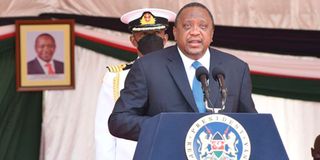Ethiopia, Sudan conflicts: Uhuru calls for vigilance among security agencies

President Uhuru Kenyatta.
President Uhuru Kenyatta on Friday called for heightened vigilance among security agencies in Kenya.
The president directed internal security agencies to heighten vigilance and surveillance across the country following the unfolding security situation in the East African region.
State House Spokesperson Kanze Dena Mararo said the instructions were issued on Friday after the National Security Council meeting.
“His Excellency President Uhuru Kenyatta has directed internal security institutions to heighten vigilance and surveillance across the country following the unfolding security situation in the region,” reads the statement.
Friday’s directive comes a week after the National Police Service said they had heightened security along Kenya’s borders following unrest in Ethiopia.
In a statement, the director of corporate communication Bruno Shioso urged Kenyans to report suspected foreigners.
“As an immediate neighbour to some of the affected countries, Kenya may be adversely impacted,” said Mr Shioso.
Undocumented foreigners
Kenyans have been advised to exercise vigilance and report suspected undocumented foreigners and unprocessed immigrants to the nearest police station.
Local communities and the government fear an influx of Ethiopian refugees, as the war raging in the country’s northern Tigray region spills into other areas. Tigrayan fighters and their allies have been advancing towards Addis Ababa.
Northern Kenya is already home to the refugee camps of Kakuma in the northwest and Dadaab in the northeast. They are among the world’s largest refugee settlements.
The country has been experiencing armed conflict and civil unrest as government forces battle Tigrayan rebels since last November.
Relations with the TPLF soured after they accused him of centralising power at the expense of Ethiopia's regional states - an accusation Ethiopian Prime Minister Abiy Ahmed denies.
The conflict in Africa's second-most populous country has killed thousands of people, forced more than two million from their homes, and left 400,000 people in Tigray facing famine.
Kenya’s foreign ministry separately said that statements inciting ordinary citizens into the conflict “must be shunned”.
Military coup
The war is threatening the stability of Ethiopia, Africa’s second-most populous country.
Uganda's President Yoweri Museveni has called an extraordinary summit of the Intergovernmental Authority on Development (Igad), in Kampala on November 16.
Ethiopia is a member of the eight-member bloc which also includes Kenya, Uganda, Sudan, South Sudan, Somalia and Djibouti. Igad, which helped broker South Sudan's peace deal, is hoping for a similar role in Ethiopia.
Meanwhile, diplomatic efforts are ongoing to try to resolve the war in Ethiopia.
The United States has issued a travel advisory restricting its embassy personnel in Addis Ababa from travelling outside the capital’s limits.
“We strongly suggest that US citizens seriously reconsider travel to Ethiopia and those who are currently in Ethiopia to consider making preparations to leave the country,” the US Embassy in Ethiopia warned.
At the same time, Sudan is in the middle of a military coup that began last week. The military dissolved civilian rule, arrested political leaders including former Prime Minister Abdalla Hamdok, and declared a state of emergency.
The coup has seen civilians hold protests in several cities, including the capital Khartoum.
The United States has cut off USD700 million worth of direct aid to the country in response to the coup and at the same time demanded that the military release the civilian leaders and restore the transitional government.
Other neighbouring countries that are in conflict are Somalia and parts of Mozambique among others.





